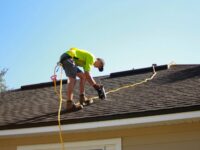The following contribution is from another author.
The weather has become more erratic than ever, and as another storm season approaches, it’s easy to be nervous about your property. We want our homes to be safe, but nature is an unpredictable force that’s hard to plan for.
Thankfully, there are countless ways to ensure your home stays standing so you can weather any storm. Follow these ideas to keep safe this season!
1. Inspect and Repair Roof Damage
There’s a lot that can go wrong with a roof! From roof leaks to missing shingles, you must make these repairs as early as possible to avoid major damage. Putting it off or trying to do a minor repair can cause emergencies and expenses.
“Storm-proofing your roof is vital for protecting your property and ensuring safety during storms. It prevents damage, enhances safety, preserves property value, and may fulfill insurance requirements. Reinforcing the structure and sealing the roof minimize the risk of damage and costly repairs.“ Jeff Gutherie of Prescott Roofing Company
2. Clean Gutters and Downspouts
Gutters and downspouts are excellent at pulling water down and away from your property, lowering your risk of flooding or leaks. Unfortunately, they can’t do this work if your gutters are cluttered with leaves and debris. To take care of this, it’s a good idea to stop and clean out your gutters at least twice a year.
Gutter guards will ease this problem, but you’ll still need to inspect your roof several times a year to ensure it’s in good shape. If you’re considering upgrading your roof, now’s the time to look into roof drip edge types so this work can be easier on you down the road.
3. Trim Overhanging Branches
Overhanging branches can pose an immediate risk to your home. Not only do they bring the risk of physical damage if they fall on your home, but they can also become a highway for animals and insects to travel across and get into attic spaces.
Try to keep all branches at least ten feet away from your home. If you’re considering planting new trees, give yourself at least twenty feet from your home and the three, or research the tree’s maximum branch length to plan.
4. Secure Outdoor Furniture and Equipment
Although we all love flexibility in design, it’s not always secure in case of a storm. Instead of letting your seating get blown away, you can do semi-permanent securing instead. Tent stakes can be a great way to hold down chairs and tables, but they’re not always the most reliable. Invest in a brand you can trust to keep things down for you.
If you have an outdoor kitchen, get a tarp or cover that can cover that counter if a bad storm arises. This will protect your outdoor appliances without you having to unplug everything and drag it into your garage.
5. Seal Windows and Doors
Preparing for storm season involves fortifying your home’s defenses by ensuring windows and doors are properly sealed. Begin by inspecting for damage and promptly repairing any defects. Install weatherstripping and apply waterproof caulk to seal gaps and cracks, reinforcing weak points as needed. Consider upgrading to storm-resistant windows and doors for added protection.
Test for air leaks and conduct regular maintenance to ensure ongoing effectiveness. Additionally, understand what is a weep hole– it’s a small opening at the bottom of window frames or door frames that allows water to drain away, preventing moisture buildup and potential damage. By taking these steps, you can minimize the risk of damage and keep your home safe during storms.
6. Check Siding and Exterior Walls
One of the largest issues in large storms is the messing up of siding and exterior walls. High wind and flying debris can bend and warp siding and rip it off your home’s exterior. This can be avoided if you regularly inspect your home’s exterior.
If your siding is older or if you can see it’s already lifting or warping to some small degree, you must stop and get it repaired or replaced before any storms hit.
7. Secure Fences and Gates
Although a fallen fence isn’t always the worst news, a broken wall or one rammed into your home by high winds can be a big problem. Check your fence multiple times a year to see what condition it’s in.
Regularly sealing your fence can help you avoid multiple problems and keep your yard and property looking fresh and well-maintained.
Proper Maintenance Will Help Your Property Last
Maintaining your property is the only way to keep its value up and avoid major damage. Consider these tips, and visit At Home In The Future for more ideas.
Author Bio
Andrea Erickson is a freelance writer who loves sharing her knowledge and expertise in renovation and Interior Design. She lives in her hometown of Austin, Texas where she enjoys spending time with her husband and decorating with her children. Andrea’s work as a freelance writer can be found on Building Product Advisor, a construction industry resource site.
















